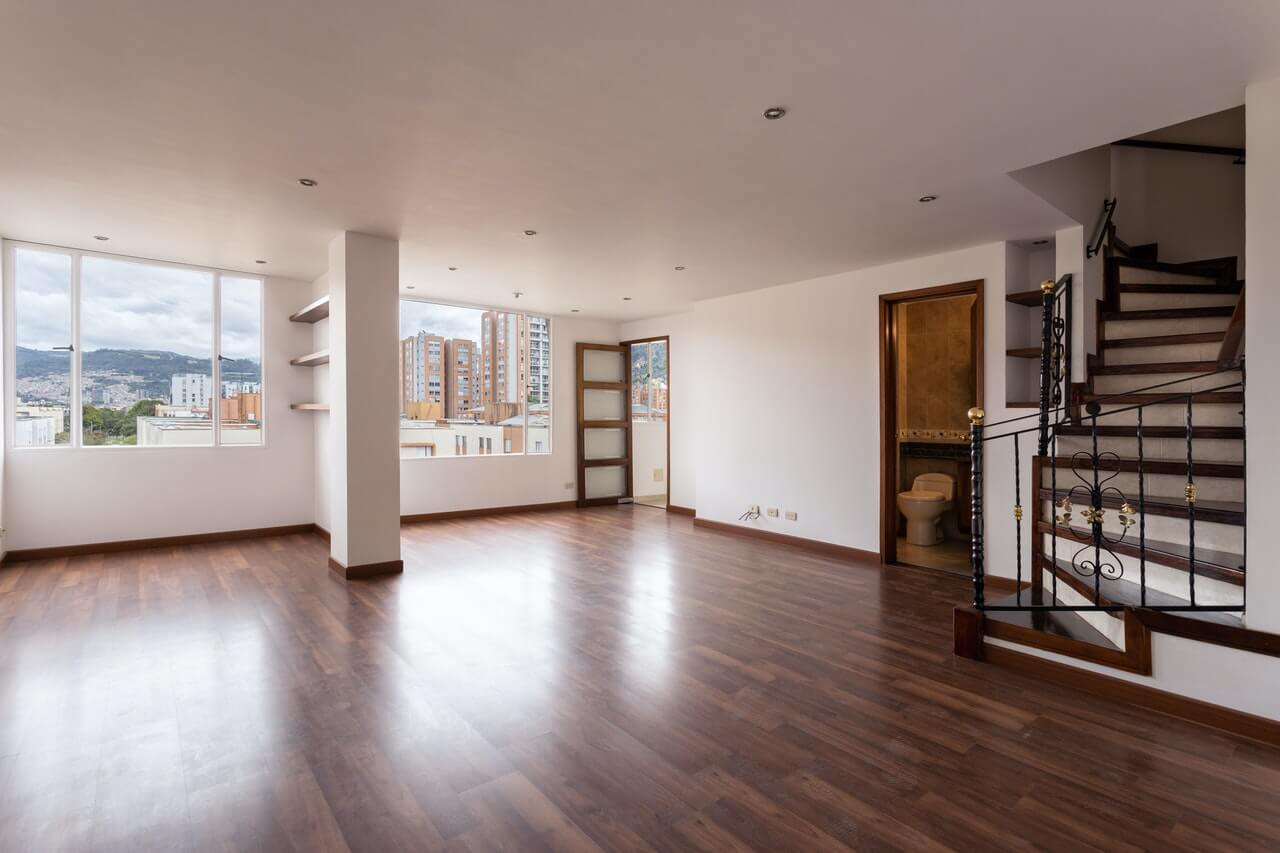How Much Does a Mortgage Cost?
The cost of a mortgage will depend on how much you have borrowed, the interest rate and the length of the mortgage term.
What Is a Mortgage?
A mortgage is a type of loan used to finance the purchase of a property. When buying a home, a buyer will need to put down a deposit and pay for the rest over a long-term payment plan with money borrowed from a bank or building society; this borrowed money is the mortgage. The mortgage is then paid back, plus interest, in monthly instalments over a fixed period of time.
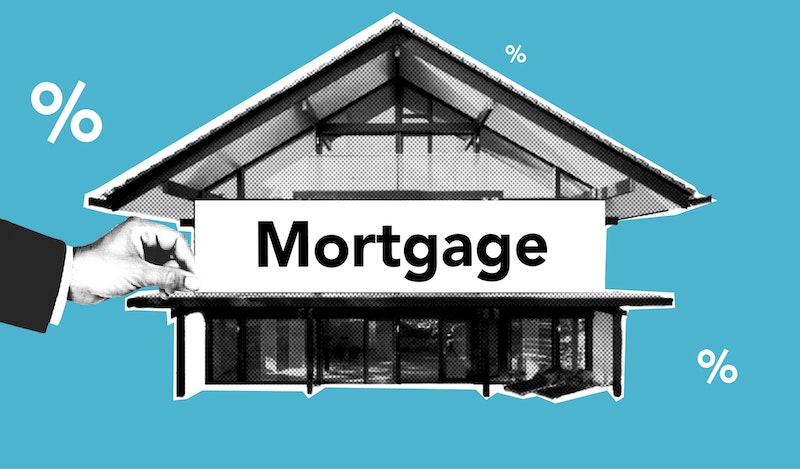
There are different types of mortgage deals available, including:
- Fixed-rate mortgages
- Tracker mortgages
- Discount mortgages
- Offset mortgages
The type of mortgage that you choose will depend on a few factors including the amount of deposit you are able to put down, the length of time you want to repay the mortgage, and how much you can afford to pay back per month.
What Is the Average Cost of a Mortgage in the UK?
According to a study carried out by Boon Brokers, the average UK mortgage payment is £723 with an average interest rate of 2.48%. However, there is a great deal of variation between different regions due to the difference in house prices.
What Factors Will Influence the Cost of a Mortgage?
Mortgage cost will be determined on a case-by-case basis, based on both the mortgage provider chosen and the personal circumstances of the borrower. In general, there are many factors that go into the decision of how much a mortgage costs.
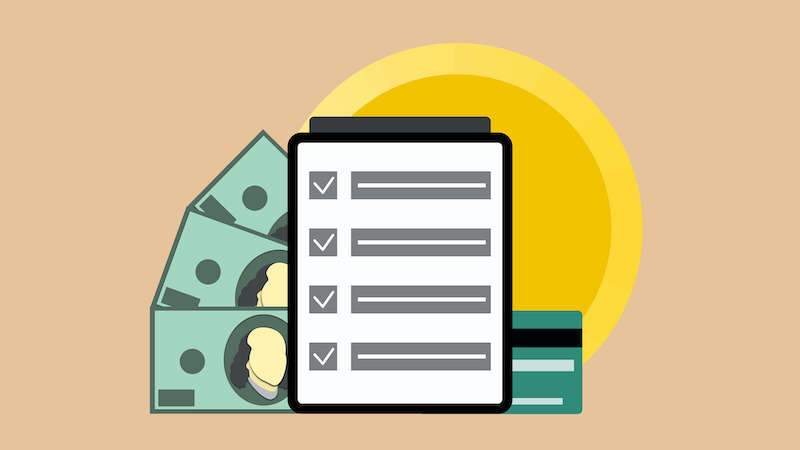
Key factors are the type of mortgage that you choose (i.e. interest-only, repayment or a mix of the two), the length of the mortgage term and the interest rate. Additionally, the amount of deposit that a buyer is able to put down will have a big impact. The value of the property will also affect the cost of the mortgage.
What Mortgage Can I Afford?
Before taking out a mortgage, lenders will look at a borrower to see if they want to lend them the money. Through this process, they will take into account income, monthly outgoing payments including any debts and the amount of savings available to put down as a deposit.
Experts suggest that a good rule of thumb is for your total mortgage not to exceed 28% of your pre-tax monthly income.
How Do Mortgage Lenders Calculate How Much You Can Borrow?
The amount of money that you can borrow will depend on the amount of income you have as well as your monthly outgoings.
Lenders will typically determine the size of the mortgage based on total annual income, be it that of a sole applicant or combined annual income for joint applicants.

Generally speaking, the higher the annual income, the higher the amount that you can borrow although there is variation between lenders with some willing to offer up to as much as six times your salary.
Will My Salary Influence the Cost of My Mortgage?
The amount that salary influences mortgages will depend on the lender, with many operating on the basis that a mortgage should be around four and a half times your annual income.
Arguably more important than salary is the debt-to-income ratio that an individual has; this is the amount of monthly debt they have relative to the amount of income they receive. If a borrower has more outgoings than incomings, it shows that a mortgage may not be affordable for them.
Along with income, a lot of lenders will require a borrower to show proof of employment, factoring in the amount that they earn as well as how long they have been in that position. For that reason, those who are self-employed, between jobs or who are not in full-time employment may find it more difficult to secure a mortgage.
Can Poor Credit History Make My Mortgage More Expensive?
Credit score is an important factor when trying to secure a mortgage; lenders will look at this in order to determine if the borrower is a good candidate for a loan. Credit scores are based on spending history including any borrowing behaviour and can see whether an individual makes repayments on time and their amount of debt. If an individual has a higher credit score, they will typically be a better candidate for a mortgage.
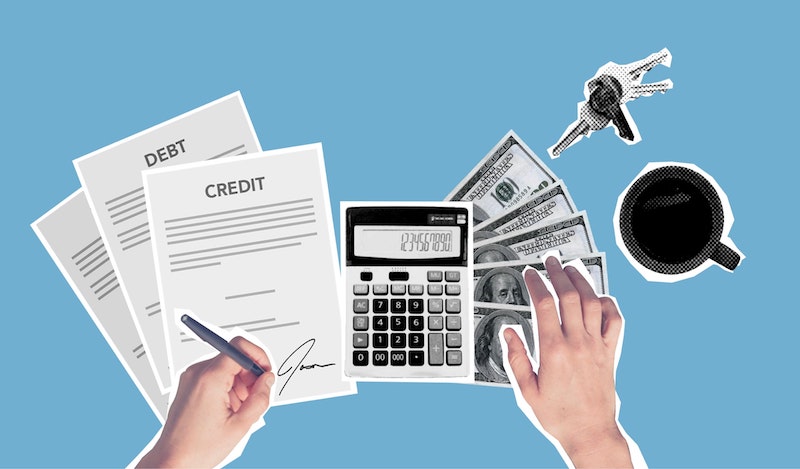
If you have a higher credit score, you may be more likely to be approved for a loan as it shows that you can reliably meet payments. This in turn may mean that you can qualify for better loan terms including better interest rates and fewer fees.
You could still secure a mortgage if you have no credit history or a poor credit score but it may be more difficult and also may be subject to less favourable rates.
Are Mortgages Cheaper With a Higher Deposit?
The standard deposit amount for a mortgage is 20% of the property’s value with 80% funded by the lender, but this varies between lenders and different mortgage products. Normally, if a borrower can put down a bigger down payment, it could save them money in the long term. It is also less of a risk for the lender meaning that they may be able to offer better loan conditions such as lower interest rates and shorter repayment period.
How Do I Repay A Mortgage?
The repayment of a mortgage is done over time, and the duration and terms of the loan repayment will be agreed up front between the lender and the borrower.
What Should I Do at the End of My Mortgage Term?
As the mortgage is paid off in monthly instalments over the course of many years, there is not something specific you need to do at the end. However, there may be small administrative tasks such as requesting a copy of your Title Deeds.

For homes purchased after 1990, they will be listed with the Land Registry so deeds can be requested directly from them. If for any reason your home is not registered with the Land Registry, you can request the deeds from your mortgage lender.
Aside from that, the only responsibility is ensuring the maintenance of the home and making sure that you have a valid home and contents insurance policy.
What Happens at the End of a Repayment Mortgage?
At the start of any mortgage agreement, terms are agreed between the borrower and the mortgage provider. As part of this, they will agree on the amount of the mortgage, the interest rate, the monthly repayment plan and the duration of the loan. Both parties agree to uphold their end of the arrangement and affordability checks are carried out at the start to ensure that this is a realistic and affordable plan.
A typical mortgage is repaid over 25 years but will depend on the specific loan terms you have with your particular lender. At the end of this term, the borrower is expected to have repaid the full amount of the mortgage plus any interest.
After achieving this, the mortgage holder will be the owner of 100% of the property’s equity and the mortgage lender will have no charge against the property. With this, the owner has full flexibility with the property meaning that, should they choose, they could release some equity from the property.
There may be some variation about the mortgage repayment if, for example, the borrower has chosen to make overpayments on their mortgage in the past. Conversely, you may have been unable to meet certain payments or taken a mortgage holiday which would mean that your payment plan is behind. It may also be that you have extended the term of your mortgage.
What Happens at the End of an Interest-Only Mortgage?
If you have taken out an interest-only mortgage, although these are increasingly less common, you will only need to pay interest on the loan during the mortgage term. This means that at the end of the agreed term, you are left to pay the full original amount that you have borrowed in one big lump sum.
With interest-only mortgages, it is advisable to use savings, investments or inheritance to help pay off the lump sum at the end of the agreed term. You can also sell your house or get a new mortgage deal in order to make this an affordable option. The option to sell is especially relevant if your home has increased in value since its initial purchase.

If you are unable to pay your interest-only mortgage, for whatever reason, you should speak to your lender as soon as possible to see if they can make any provisions.
Another option could be switching to an alternative mortgage type (a repayment mortgage) with your current lender to introduce the concept of monthly repayments and make the mortgage more affordable. You can also choose to switch only a part of your mortgage to repayment.
How Can I Repay My Mortgage Early?
There are many different options to repay a mortgage ahead of time, although you should always check whether this is possible with your mortgage lender as sometimes it can incur a fee. Here are some of the possible ways to pay off your mortgage early:
- Make extra mortgage payments
- Refinance your mortgage
- Make lump sum payments
- Recast your mortgage
Make Extra Mortgage Payments
Rather than monthly payments, you can speed up the pay off process by making biweekly mortgage payments or an additional payment per month. Overall this leads to 13 months of mortgage payments annually instead of 12 meaning that you are reducing the length of time you will be paying off your mortgages.
The other option would be to pay more in each monthly instalment meaning that you can make a greater dent in the total amount owed.
Refinance Your Mortgage
Refinancing your mortgage to achieve an earlier repayment is only a logical solution if you can get a lower interest rate. The option to refinance usually comes with associated fees so you need to make sure that this is actually logical from a cost point of view.
It is also possible to refinance to gain a shorter-term loan which will also mean that you are paying off less interest in the long run.
Make Lump Sum Payments
Whenever you have more money accessible, you can make lump-sum payments to your principal. For example any work-related bonuses, inheritance or even the sale of valuable personal items can provide funds which can be used as extra cash to advance your mortgage.
You can check with your mortgage provider that you are able to do this and will need to specify that you want to apply the lump-sum payments to be put towards the principal. This could be a good option for avoiding the associated fees of refinancing or recasting.
Recast Your Mortgage
When you recast your mortgage, you keep your existing loan but pay a lump sum towards the principal. Following this, your lender will adjust the amortisation schedule resulting in a shorter loan term. This can work out as a cheaper option as it incurs lower fees than refinancing.
How Big a Mortgage Can I Get?
The size of the mortgage that you will be able to afford will depend on different variables including income, monthly outgoings and the value of the property you want to purchase.
What Is a Mortgage?
A mortgage is a type of home loan and acts as an agreement between borrowers and lenders in which a property is used as a guarantee. Once the mortgage transaction is made, borrowers will receive money and agree to a repayment plan with interest paid back to the lender over a set time period.

What Size Mortgage Could I Afford?
The size mortgage you can afford will depend on your circumstances. Before taking out a mortgage, lenders will look at a borrower to see if they want to lend them the money. Through this process, they will take into account the following factors:
- Income
- Monthly outgoing payments including any debts
- The amount of savings available to put down as a deposit
Experts suggest that a good rule of thumb is for your total mortgage not to exceed 28% of your pre-tax monthly income.
How Do Mortgage Lenders Decide How Much You Can Borrow?
The amount of money that you can borrow will depend on your income (most likely your salary) as well as your monthly outgoings.

Mortgage providers, including banks and building societies, will most likely determine the size of the mortgage based on the total annual income of the borrower or the joint annual income if there are multiple borrowers.
The general rule of thumb is that the higher the annual income, the higher the amount that you can borrow although there is variation between lenders with some willing to offer up to as much as six times your salary.
How Does Salary Influence the Size of Mortgage I Can Get?
The amount that salary influences mortgages will depend on the lender with many operating on the basis that a mortgage should be around four and a half times your annual income.
Arguably more important than salary is the debt-to-income ratio that an individual has; this is the amount of monthly debt they have relative to the amount of income they receive. If a borrower has more outgoings than incomings, it shows that a mortgage may not be affordable for them.
Along with income, a lot of lenders will require a borrower to show proof of employment, factoring in the amount that they earn as well as how long they have been in that position. For that reason, those who are self-employed, between jobs or who are not in full-time employment may find it more difficult to secure a mortgage.
Will My Credit Score Impact How Big a Mortgage I Can Get?
Credit score is an important factor when trying to secure a mortgage; lenders will look at this in order to determine if the borrower is a good candidate for a loan. Credit scores are based on spending history including any borrowing behaviour and can see whether an individual makes repayments on time and their amount of debt. If an individual has a higher credit score, they will typically be a better candidate for a mortgage.

If you have a higher credit score, you may be more likely to be approved for a loan as it shows that you can reliably meet payments. This in turn may mean that you can qualify for better loan terms including better interest rates and fewer fees.
You could still secure a mortgage if you have no credit history or a poor credit score but it may be more difficult and also may be subject to less favourable rates.
How Does Deposit Affect Mortgage Affordability?
The standard deposit amount for a mortgage is 20% of the property’s value with 80% funded by the lender, but this varies between lenders and different mortgage products. Normally, if a borrower can put down a bigger down payment, it could save them money in the long term. It is also less of a risk for the lender meaning that they may be able to offer better loan conditions such as lower interest rates and shorter repayment period.
Do I Need A Mortgage Broker?
Working with a mortgage broker can potentially save homebuyers a great deal of time and money. Before deciding if you want to work with a broker, there are a few things to consider to ensure that this is the right choice for you.
What Does a Mortgage Broker Do?
A mortgage broker is the middleman between the homebuyer and the mortgage lender. They work on the behalf of the borrower to find the best mortgage to suit their personal circumstances.
Mortgage brokers are specialists in their sector and, subsequently, can offer expert impartial advice about the best mortgage products, regardless of whether the borrower is hoping to buy a home or refinance.

They work to find the most competitive rates and prices on the market as well as making sure that the mortgage product matches the client’s needs. Mortgage brokers can also help borrowers assess the size of mortgage they are able to apply for.
It is important to note that the mortgage broker does not supply the mortgage funds. Instead, they source the funds on behalf of the borrower and then match the borrower and the client.
Benefits of Working With a Mortgage Broker
There are many advantages to working with a mortgage broker and can be a great choice for homebuyers, especially first time buyers who lack market knowledge. The housing market can be overwhelming and with so many mortgage offers available, it can be difficult to know where to begin. Mortgage brokers help simplify the process and can take away the headache of research.
One of the key benefits of working with a mortgage broker is that they look for the most competitive mortgage rates on the market, both in regards to interest rates and fees. Brokers typically have access to a broad range of mortgage products and lenders meaning that they have a bigger pool available and can find deals that you may otherwise not have been able to find.
A key advantage of working with a broker is the huge amount of time they can save you. Researching the best mortgage on the market can be a never ending process with so many options available and every lender claiming to have the best deal. Brokers are able to cut through the many different options available to find you the most suitable product to suit your personal circumstances. In addition, they can negotiate on your behalf and keep track of the mortgage process through the different stages.
For mortgage situations which are less straightforward, for example those with poor credit history or seeking mortgages for unusual properties, brokers have access to a greater range of lenders who may be able to loan money in specialist circumstances or with more flexibility.
Disadvantages of Working With a Mortgage Broker
There can be certain drawbacks when it comes to working with a mortgage broker. For example, not all lenders work with mortgage brokers meaning that even though the broker may have access to a range of loan products, there are some programs unavailable to them which can only be accessed directly through a financial institution.

In some scenarios mortgage advisors are free, however in others, working with a mortgage broker will mean that the borrower has to pay for the service. This will vary from broker to broker and often the broker fee is covered by the lender. However, if the mortgage broker charges a fee, this is an additional payment that the homebuyer will need to take into account. This may be a flat rate, hourly rate or a percentage of the total loan amount.
The other disadvantage of working with a mortgage broker is that there is a potential for conflict of interest. If a mortgage broker is being paid a commission by the lender, it could be that the broker is favouring the lender and therefore not working in the best interest of the client. If this is the case, it is possible that the broker is not offering the client the best deal available.
Factors To Consider When Working With a Mortgage Broker
If you do decide to work with a mortgage broker there are a few important factors to take into account.
Who Is Responsible for Paying the Mortgage Broker?
Before working with a mortgage broker, you need to know how they will be paid and if the cost will be covered by the lender or paid by the homebuyer. Checking this information up front will avoid any surprises at the end of the process. If the lender is covering the fee, take into account the potential conflict of interest.
Which Lenders Does the Mortgage Broker Work With?
Different mortgage brokers have a different pool of lenders that they work with.
Before deciding which mortgage broker to work with, it's good to consider the following factors about them:
- Level of experience
- Licence
- References or referrals
If you are looking for a particular type of mortgage product, you should make sure that the mortgage broker you choose has access to these.
Level of Experience
Before deciding to work with a mortgage broker, make sure that they have sufficient experience, particularly if you are interested in a specific loan type.
Licence
If you are working with a mortgage broker you must check that they are licensed to work. If you are looking to work with a mortgage broker in the UK, they need to be registered by the Financial Conduct Authority (FCA) or be the agent of a regulated firm.
References or Referral
Working with a mortgage broker who has been personally recommended is a great way to ensure that you are working with someone trustworthy. If you are working with someone who has not been recommended, make sure to check references, read client reviews or try to speak to someone who has had personal experience with that broker.
Can You Get a Student Loan for a Master’s Degree?
You can receive a specific loan when studying a master's degree in order to help with course fees and living costs.
What Is a Postgraduate Master’s Loan?
A Postgraduate Master’s Loan can help with course fees and living costs while you study your master’s degree.
How Much Can I Get for a Master’s Loan?
The amount that you can receive for a master's loan will depend on when your course starts. If you start your course after the 1st August 2021, you are entitled to receive £11,570.

This amount is independent of your personal income or household income. However, the Department for Work and Pensions may take into account any benefits you receive.
Your loan will be paid directly into your bank account and is at your disposal to use for course fees and living costs. Should your course last for longer than a year, the loan will be divided equally across each year of the course.
When Will You Start Receiving Payments for a Master’s Loan?
You will not receive the first payment of your loan until after your course start date and your university or college will need to confirm that you have successfully registered.
Usually, the loan will be paid in 3 instalments across the year (representing 33%, 33% and 34%).
Once your application has been approved, a letter will be sent to you confirming your payment dates.
Who Is Eligible for a Master’s Loan?
Your eligibility to receive a master's loan will depend on the course you are applying for, your age and your nationality or residency status.
If you are already receiving payments from Student Finance England for another course that you are studying, you will not be able to apply for a Postgraduate Master’s Loan.
Similarly, if you have already received a loan or grant for a master’s course in the past, or already hold a master’s degree or the equivalent or higher, you cannot apply. However, if you have a PGCE or postgraduate diploma or certificate, you will still be eligible.

If you are currently behind on your repayments for any previous loans from the Student Loans Company, you will not be able to take out a Postgraduate Master’s Loan.
The course that you are studying must be provided by an eligible UK-based university or college. You can check with your university or college before applying in order to check that your course is registered.
You can be eligible to receive a Postgraduate Master’s Loan regardless of whether you are planning to study your master's on a full-time or part-time basis.
You must be under the age of 60 on your first day of the first academic year of your course in order to get a Postgraduate Master’s Loan.
How Can You Apply for a Student Loan for a Master’s Degree?
The easiest way to apply for the Postgraduate Master’s loan is to apply online via www.gov.uk/studentfinance.
You will first need to set up a Student Finance England account, if you do not already have one from a previous loan. If you are applying for the first time, you will be assigned a unique Customer Reference Number and will need to create a password and secret answer.
Once you have done that, you can fill in and submit an application. To do this, you will need to provide proof of identity, usually by entering your UK passport details. At this stage, you will also be asked how much Loan you want to receive up to the maximum available for your course. If your course is longer than one year, you will be asked how much you want to receive in your first year.
Importantly, you will need to apply no more than nine months after the first day of the final academic year of your course if you want to receive a Postgraduate Master’s Loan.
Finally, you may need to send any evidence to support your application. This may be a non-UK passport or a UK birth or adoption certificate. Sending these off as quickly as possible will help avoid any delays in processing.
How Do I Repay My Master’s Loan?
Repayments of your master’s loan will not start until the April after you finish your course, and this will only be if your income meets the national repayment threshold (currently £21,000 a year before tax and National Insurance).
Payments will be taken in different ways depending on your employment status. If you are employed, repayments will be taken automatically from your salary along with National Insurance and tax. These payments will stop automatically if you stop working or if your salary does not exceed the threshold.

If you are self-employed, you will need to include the repayments as part of your self-assessment at the same time as paying tax.
If you move away from the UK, you will need to advise Student Finance England and organise direct payment to them.
The amount that you repay will not depend on how much you have borrowed but on your income. In general, you will be expected to repay 6% of your income over £21,000 (annually).
Do I Need To Pay Interest on a Student Loan for a Master’s Degree?
Interest will be charged on your Postgraduate Master’s Loan starting from your first payment from Student Finance England and building until the loan is fully repaid or cancelled.
The interest rate will most likely be charged at the Retail Price Index (RPI), which is a benchmark of UK inflation, plus 3%.
If the Postgraduate Master’s Loan balance is not paid 30 years after the repayment is due, it will be cancelled.
How Does LTV Work?
LTV works as a percentage of a property’s value that a lender is willing to lend you. For example, if you had 30% of the property’s value to put down as a deposit, a lender could offer you the remaining money to buy the house through a 70% LTV mortgage.
There are a range of different LTVs available to borrowers, and a variety of eligibility criteria to meet for them. Here, Octagon Capital takes you through the essentials on LTVs, including why they’re important, what’s a good LTV to have and how to calculate the one you’ll need.
What Is an LTV Ratio?
Your LTV (or Loan to Value), is a way of expressing the amount of money you’re borrowing with a particular mortgage or loan compared to the property’s/asset's total value.
The LTV is expressed as a percentage – this being the percentage of the property’s/asset's value you’ve borrowed.

For example, if the property’s total value is £300,000 and you borrow £210,000 in the mortgage, the LTV on this will be 70%. While a 70% LTV mortgage will pay for a substantial chunk of the property, you’ll also have to provide the remaining 30% through a deposit. Using our example above, if your property’s total value is £300,000 and you borrow £210,000 through a 70% LTV mortgage, you’ll have to offer £90,000 as a deposit.
It's worth noting that LTVs don’t just apply to mortgages, but are relevant for any type of secured loan, including Bridging Loans.
Why Is LTV Important?
LTV is important as it represents the percentage of a property or asset's total value the lender is willing to loan you. Deciding the LTV you’re wanting to borrow is an important decision, that takes many factors into consideration, including your affordability, the amount you can provide in a deposit, and how much of a risk your ideal LTV is for a lender to loan you.
The higher the LTV on a loan, the greater the risk the lender is taking on. If a lender has provided a high LTV mortgage to a borrower, and that borrower is unable to make repayments, the lender will make back less money if they have to repossess and sell the house the loan is secured on to.
The lower the LTV the less the risk is for the lender. Therefore, you’ll typically find lenders save their top deals for those wanting low LTVs, meaning if you can afford a higher deposit and a lower mortgage, you may get access to better deals.
What’s a Good LTV To Have?
As lower LTVs typically come with better deals, generally, lower LTVs are viewed as a more ideal mortgage to get.
High LTVs are considered anything that’s above 80%, and can come with higher interest rates than lower LTVs. For example, a 60% LTV mortgage may offer better deals than a 70% LTV.

However, while lowering your LTV can help you access better deals, for mortgages, your options will depend on your circumstances, including the property’s value, how much deposit you can afford and other details surrounding your affordability.
There are a range of different LTVs available for loans, including:
There’s no minimum LTV, however the amount available can depend on the lender, the loan type and the details of your application.
70% LTV
A 70% LTV loan will allow you to borrow 70% the value of the asset the loan is being secured against (e.g., a property).
For example, if you’re looking to purchase a property worth £200,000 and have £60,000 available for this, you could borrow a 70% LTV loan to make up the remaining £140,000 for this purchase, and use the £60,000 as a 30% deposit.
75% LTV
A 75% LTV loan will help you borrow 75% of an asset’s value, with borrowers having to make up the remaining 25% as a deposit.
For example, if you’re looking to buy a £200,000 property and have £50,000 available to put down on this, a 75% LTV loan would help you borrow the remaining £150,000 to complete the purchase on this property. In this circumstance, the £50,000 would be used as a 25% deposit.
80% LTV
With an 80% LTV, borrowers are loaned 80% the value of the asset the loan is being secured against, and will have to make up the remaining amount in a 20% deposit.
For example, those wanting to buy a £200,000 property and have enough for a 20% deposit (£40,000) can borrow the rest of the money for the purchase (£160,000) via an 80% LTV loan.
85% LTV
Borrowers who are loaned an 85% of the asset’s value will have to provide the remaining 15% for the purchase.
For example, borrowing an 85% LTV loan on a £200,000 property means the lender is loaning the borrower £170,000 – the lender having to make up the remaining 15% (£30,000) as their deposit.
90% LTV
A 90% LTV loan offers borrowers 90% of the asset’s value – borrowers having to make up the remaining 10%.
For example, on a £200,000 property, a 90% LTV will provide £180,000. The remaining 10% (£20,000) will have to be provided by the borrower.
95% LTV
A 95% LTV loan allows you to borrow 95% of the asset, borrowers having to make up the remaining 5% in a deposit.
The government’s guarantee scheme enables borrowers to apply for a 95% LTV mortgage, meaning you’d only have to provide a 5% deposit to purchase the property.
Can I Get a 100% LTV Loan/Mortgage?
While uncommon, there are lenders out there who offer 100% LTV loans and mortgages. For this particular LTV loan, borrowers won’t have to provide a deposit, the lender covering (as the name of the loan suggests) 100% of the asset’s purchase.

The majority of 100% LTV mortgages require a guarantor. In these circumstances, a borrower will have to get a guarantor for the loan (typically a family member or a close friend) to add extra security for the lender, and reassure them that the loan will be paid back.
You can also find 100% LTVs available for certain bridging loans. While the majority of bridging loan providers have strict caps on their available LTVs, sometimes, in certain circumstances, lenders might be willing to offer 100% of the asset’s value to the borrower. Find out more about 100% LTV bridging loans by following the link.
How To Calculate My LTV
To calculate your LTV you’ll firstly need to subtract your available deposit from the asset’s/property’s value – this will give you the amount you need to borrow. Once you have this figure, divide it by the asset’s/property’s total value, and multiply the result you get by 100. This will give you the percentage you need your LTV loan to be.
For example, say you want to buy a house that’s worth £300,000, and have £51,000 available as a deposit. Minus the £51,000 from the original £300,000 to get £249,000 – the total amount you’ll need to borrow. Then, divide 249,000 by 300,000, and times the result by 100 to get the LTV you need – the LTV in this example being 83%.
Here’s the calculation in 3 simple steps:
- Step 1: The asset’s/property’s total value - your deposit = the amount you need to borrow
- Step 2: The amount you need to borrow / the asset’s/property’s total value = ?
- Step 3: ? x 100 = the LTV you’ll need
How Can I Get a Lower LTV?
There are a number of different ways you can lower your LTV. Lowering your LTV can help you access better rates on your borrowing options.

Below, we’ve listed ways your LTV can be lowered:
Save up for a larger deposit: The bigger the deposit you can offer, the lower the LTV loan you can get. Therefore, if you keep building up your savings and use these to offer up a larger deposit, you could find yourself accessing lower LTV loan deals.
House prices rise: If the value of your house/property rises, the amount that’s covered by the mortgage declines, thereby lowering your LTV. You can potentially help further add to the value of your property by making any repairs or investing in renovations.
House prices also typically increase over time anyway, which can help to further lower your LTV.
Are LTVs Different on a Buy-To-Let Mortgage?
You may find the LTVs available on a Buy-To-Let Mortgage are lower than those available with residential mortgages. The most you’ll typically find you can borrow with a Buy-To-Let Mortgage is 80% LTV, as they are considered a greater risk for lenders than standard residential mortgages.
Are LTVs Different on a Bridging Loan?
As bridging loans serve a different purpose than standard residential mortgages, it’s no surprise that the way LTVs are operated also differs between these two lending options.
Bridging loans, as their name suggests, can help ‘bridge the gap’ between a purchase and a sale. They can help borrowers to complete on a property within a tight timeframe, and are commonly used by landlords, investors, property developers and homeowners.

The LTV offered on a bridging loan is the amount of money the lender is offering the borrower as a percentage of the asset’s total value. For example, if someone is offered a 70% LTV bridging loan, they’re essentially being offered 70% of the property’s value as the loan.
75% LTV is the maximum amount a regulated bridging loan provider will go to. This LTV can however increase when opting for unregulated providers, who can go up to 80%, 90% and sometimes even up to 100%.
Unregulated bridging loans can only be secured by properties used solely for business or investment purposes. This means that you can’t secure an unregulated bridging loan on a borrower’s residential home.
You can find out more about bridging loans and the different LTVs available by following the link.
Can You Get a Mortgage on Furlough?
Due to the coronavirus pandemic, many found themselves on government furlough implemented by their employers, affecting wider finances including loans and mortgages. However, it is still possible to receive mortgage approval whilst on furlough.
Can I Get Approved for a Mortgage if I’m on Furlough?
If you are currently on furlough during your mortgage application, it may still be possible to get approved for a mortgage but you will need to demonstrate to the lender that you will be returning to work and that your job will be secure in the future.

Being on furlough is still technically classed as remaining in employment so it should not impact the choice of mortgage deals available to you.
In order to prove this, the majority of mortgage lenders are requesting employment references from furloughed borrowers and want to see a payslip when you return to work at the earliest opportunity to protect themselves against “furlough fraud”.
Which Mortgage Providers Can Approve Mortgages for Those on Furlough?
There are many well-known mortgage lenders that are considering applications for individuals on furlough including Post Office Money, Metro Bank and Santander. In addition, there are even specialist mortgage providers who aim to offer deals especially for those in these circumstances.
In general, mortgage approval will be done on a case-by-case basis and there will also be variation between lenders. For example, the majority will request a letter from an employer and some will have stricter lending criteria than normal.
Working with a mortgage advisor could help match you to the lender most suited to your personal circumstances. Mortgage advisors can find you the best deal possible and the most favourable terms. They also allow you access to a broader range of deals rather than working with one specific bank or building society who are limited to their own products.
Am I Able To Get a Mortgage After a Furlough?
You can still get a mortgage if you are furloughed and if you have returned to work after furlough, there is no reason why you should not be eligible to apply for a mortgage.

As with any mortgage, you will need to meet the lender’s eligibility criteria and present any required documentation. If you have only recently returned from furlough leave, it is possible that some mortgage providers may be more cautious with your application and may view your application as risky, particularly if you are working in a sector that is under ongoing threat and is subsequently more “high-risk”.
How Will Furlough Affect My Mortgage Application?
If you are currently still on furlough leave, it may reduce the pool of mortgage lenders who are available to you, particularly if you are unsure about future employment. Those who have only recently returned to work or who are working for companies or in sectors that are deemed less stable, may have more difficulty securing a mortgage.
However, the majority of lenders will still consider your mortgage application whilst you are on furlough, taking into account your full income and any potential subsidiaries from your employer.
What Happens if I Cannot Pay My Mortgage While on Furlough?
In order to support those who have been furloughed struggling to meet their mortgage payments, the government implemented various measures. Since March 2020, there have been initiatives available to help homeowners who are struggling to pay their mortgage following the impact of the coronavirus pandemic.
The Financial Conduct Authority (FCA) has implored lenders not to repossess properties whilst these measures are in place and in general mortgage lenders are being advised to be more lenient with their customers on furlough if they are in times of financial difficulty.

Another measure that the government introduced was optional mortgage payment holidays for customers. This means that borrowers can make an agreement with their lenders that they will not need to make a mortgage payment for a three-month period (extended to six additional months after October 2020). However, experts suggest that this should only be as a last resort given that interest will continue to accrue.
Some lenders are offering customers the chance to switch to an interest-only agreement meaning that they will only need to pay monthly instalments which cover the interest rather than paying off the capital.
Can I Get A Mortgage?
In order to buy a home, the majority of people will need to take out a mortgage. A mortgage is an agreement made between a borrower and a lender that entitles the homebuyer to borrow money in order to buy the home. This agreement is made on the condition that if they fail to repay the money, the lender has the right to the property.
Mortgages are used to buy a home or to refinance a home that is already owned. They can come from banks, credit unions or other financial institutions. Regardless of where you are borrowing the money from, there will be certain criteria that needs to be met before being allowed to take out a mortgage.
Am I Eligible for a Mortgage?
The eligibility criteria for a mortgage will vary depending on the lender and your own financial circumstances. Here we share some key factors that could determine whether or not you would be eligible for a mortgage...
- Your credit score
- Your deposit
- Your debt-to-income ratio
- Your employment history
- The value and condition of the property

Credit Score
A person’s credit score is determined based on past transactions and borrowing behaviour. Checking the credit score is a standard first step for the majority of lenders after the initial mortgage application. In general, the higher someone’s credit score, the more likely they are to be approved for a mortgage and the better interest rates they will receive. Individuals with good credit scores are understood to be less of a risk for a lender.
For those with a poor credit score, it is not impossible that they will be approved for a mortgage, however it is usually more difficult. This is especially true for conventional mortgages. It is possible to increase your credit score by paying off outstanding debts, ensuring that payments are made on time and avoiding applying for any other type of loan or credit in the lead up to your mortgage application.
Deposit
In order to take out a mortgage, lenders will typically want the borrower to put some money down on the home so that they have some equity in the property. This can work to protect the lender because if the borrower has to default on the loan, the lender will still get their money back in full regardless of any additional fees incurred.

Typically, borrowers put down 20% of the cost of the property and will borrow 80%. Most homebuyers understand that they will need to save up 20% of the property’s value in order to put down a decent deposit. However, there are mortgage products available that offer mortgages with the need for a far lower down payment. It is unlikely that you will see mortgages where the lender allows you to put down less than a 5% deposit.
Generally speaking, the higher the deposit you are able to put down, the better the terms of your loan, be it the interest rate, the total value of the loan or the length of the loan term.
Debt-to-Income Ratio
Your debt-to-income (DTI) ratio is the amount of debt an individual has relative to their income. The “debt” includes mortgage payments and other loans. For example, if the accumulated cost of your house, car loan and other loan payments is £1,500 a month, and your monthly income is £5,000, then your debt-to-income ratio would be 30%. In layman’s terms, your debt represents 30% of your income.
When applying for a traditional mortgage, debt-to-income ratios are usually capped at around 43% maximum, although this will vary from lender to lender.
In general, if you owe a lot of debt, you will be viewed as a riskier loan candidate which may in turn mean that it is harder to be approved for a mortgage or that you will have less favourable loan terms.
Employment History
All types of lenders for all types of mortgage products will require proof of employment. The majority of lenders will want evidence that you have worked for a minimum of two years and have a steady income source.

If you do not have an employer, you will need to provide proof of income. This is why freelancers, individuals who have changed jobs in the past two years, or those who have had periods of unemployment may find it more difficult to be approved for a mortgage.
The Value and Condition of the Property
Before lenders agree to loan any money to the borrower, is is common for them to want to carry out an inspection or appraisal in order to ensure that the property is good value for money and is in good condition. Basic checks should be carried out to determine that the property is sound and will not be a liability during the loan term.
The appraised value of the home will determine how much the lender is willing to lend to the borrower. Thus, if you want to pay more for a property and the lender does not agree with your offered price, you will need to put up more of the cost in addition to your down payment.
How Much Does a Professional House Clean Cost?
Professional house cleaning will range between £10-£60 per hour. The reason for such a broad range is that the cost will depend on the specific type of house cleaning that is required.
Different home cleaning tasks will have varying levels of difficulty. Simple weekly cleans to keep your house neat and tidy will cost between £10-25 per hour. For an average 3 bedroom house in the UK for a regular light clean you could expect to pay £150-250.
Cleaning jobs that are more difficult , requiring more skill , specialist cleaning products and machinery will cost significantly more. Carpet cleaning for example costs £25-60 per hour given specialist chemicals and equipment are required. Deep cleaning is a much more thorough service than a routine clean and will also cost more. Given the difficulty of deep cleaning , such as cleaning an oven appliance , it can cost as much as £40-60 per hour.
End of tenancy cleans are particularly meticulous and can cost £50-100 per hour. These cleans require far more work given they are being returned to a near perfect state of condition for new inbound tenants. The same is true for after builders cleans which are cleans post renovation work. The clean of these homes will require more extensive work such as cleaning rubble out of the carpets and will cost £30 per hour.
House cleaning costs at a glance:
- £10 to £25 per hour (based on London prices)
- £150 - £250 full house clean of 3 bedroom house (based on London)
- £25 to £60 per hour for carpet cleaning
- £40 to £60 for deep cleaning
- £50 to £100 for end of tenancy cleaning
Source: Serna FM
What factors impact the price of a professional house clean?
There are many factors that impact the price of a house clean , varying from the difficulty of the task to the time required to complete the task. Here’s a breakdown of the main factors that impact the cost of cleaning your home:
- Location: price will vary on location. Expect to pay more in areas with higher living costs. This is usually the case in larger cities, particularly London
- Difficulty: the more challenging and unappealing a task the more it’ll cost. Oven cleaning and window cleaning represent good examples here.
- Type of cleaning: price will depend on the tools , expertise, training and intensity of cleaning required to fulfil the task. Light dusting will cost considerably less than external window cleaning . The most expensive cleaning jobs are those that require industrial equipment to aptly complete the job
- Pets or kids: kids and pets will increase the level of dirt, fur, stains etc. in your homes. Consequently it will take longer to clean these homes which results in higher costs
- Size of the area: the larger the area is, the more it will cost to clean. The cleaner will need to assess the square footage of the building to correctly quote their prices.More experienced companies will do a site evaluation beforehand and give indicative pricing.
- Time required: this will be a function of the size of the area that is required to be cleaned as well as the difficulty of the task. The more time it takes the higher costs will be.
- Size & number of windows: if window cleaning is also required the number of windows will impact pricing. Larger windows and those that are harder to reach take longer to clean and will cost more. The more glass there is to clean, the more it’ll cost.
- Experience: More experienced cleaners and cleaning agencies will charge more. Typically they will be more skilled and have access to better equipment and cleaning supplies.
- Frequency: the more often you require a cleaner, the more the costs will stack. However, reduced rates can often be negotiated when regular cleaners are required.
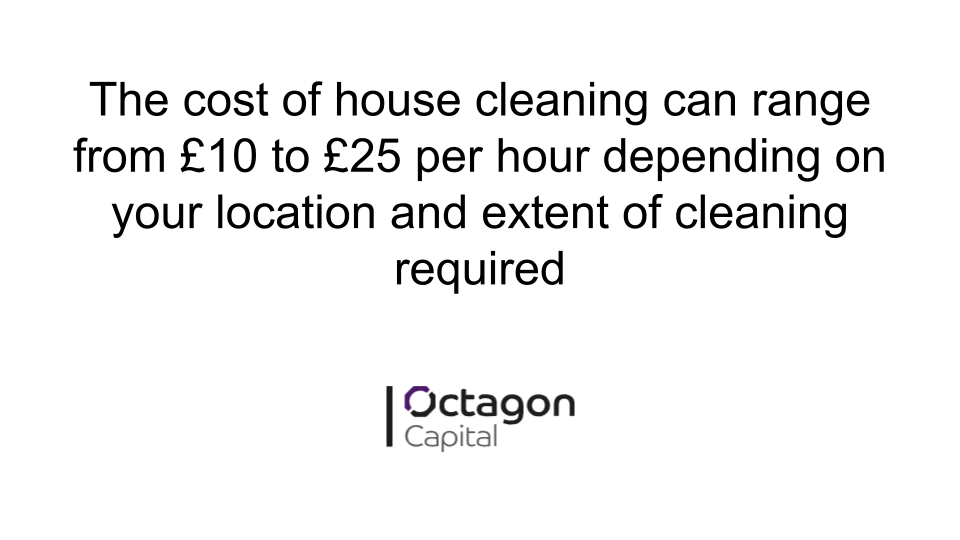
What is involved in a professional house clean?
Tasks involved in a professional house clean will depend on the type of cleaning you require. For a routine general house clean this will involve; dusting, hoovering, wiping down surfaces, cleaning toilets and tidying.
For a more in depth clean such as an end of tenancy clean more extensive services will be required. This could include; carpet cleaning, oven cleaning, cleaning out of fridges and freezers, cleaning windows and the cleaning of the inside of shelves and cupboards.
After renovations , a thorough clean of the home is required before handover. After builders cleans often includes removing construction debris and removing soil and grit from carpets amongst other standard deep cleaning services
What is involved in the clean will depend on specifically what you have requested. Some specialist cleaning companies can come and clean just your carpets or just your windows. Make sure to explain in detail specifically what cleaning services you require when speaking to a potential cleaning company. What is included as a standard will vary from company to company so make sure to enquire what is involved in their standard house clean. We’d even recommend creating a task list for the cleaner to ensure the exact cleaning you require is completed.
What Is a Mortgage Broker?
Mortgage brokers save home buyers time and money by helping them to find the best mortgage deal with the most favourable terms to suit their personal circumstances.
What Is a Mortgage Broker?
Mortgage brokers are a specialists with expert knowledge of the mortgage market. Also known as independent mortgage brokers, these brokers are able to offer impartial advice helping you to compare and contrast different mortgage products to suit your personal needs.
What Do Mortgage Brokers Do?
Mortgage brokers will act as a key contact between borrowers and mortgage providers, aiming to find the best match to suit the needs of each party.
Their job is to find the most competitive rates and mortgage terms for the borrower as well as ensuring that the mortgage product is well-suited to the needs of the client. Mortgage brokers can help borrowers determine the size of mortgage they are able to qualify for.

The mortgage broker does not lend the mortgage but acts as a middle-man between the client and the lender, sourcing mortgage loans from a lender and matching them to the client.
One of the key benefits of working with a mortgage broker is that they have access to a range of mortgage products across different banks and lenders. This means that the borrower is not limited to the mortgages available at one particular bank.
Does a Mortgage Broker Carry Out All Services?
Mortgage brokers can only make the match between the borrower and the lender, aiming to find the best deal on the market to suit the needs of the borrower. However, they cannot supply the funds themselves.
Additionally, it should be noted that they cannot recommend any mortgages that are exclusively available if you approach the mortgage provider directly.
Can Mortgage Brokers Negotiate Fees?
Depending on the mortgage broker that you are working with, it is possible that the mortgage fees are not set in stone and there may be the potential for negotiation.

However, there is also sometimes the option to cut out the middleman and for homebuyers to negotiate mortgage rates and fees with banks and mortgage lenders directly.
How Much Do Mortgage Brokers Charge?
Mortgage broker fees vary between different brokers but the fees will tend to vary between 0.3% to 1% of the total value of the loan. You should never be asked to pay more than this in broker fees.
How Do Mortgage Brokers Make Money?
Mortgage brokers may or may not charge you for their service depending on the situation. Most often, the product you choose (i.e. the type of mortgage) and the value of the mortgage will affect whether or not you will be charged a fee.
Mortgage brokers could receive money from the client directly for their services or may be paid commission by the lender for any new business that they bring in.
If the client is paying, the broker may charge a percentage of the total mortgage amount or could charge a flat fee or hourly rate for their services.

For brokers that are paid by the lender, there will be an agreed commission rate. In these scenarios there might be a conflict of interest as the mortgage broker could be working for the commission from the lender rather than acting in the best interest of the client and opting for the best deal available.
Fee-free mortgage brokers will not pay the customer but will receive a commission from a lender. When brokers advertise a fee-free service, this may just refer to their initial advice being free. If the broker then does go on to find you a mortgage, they may charge a fee at a later stage.
What Is the Difference Between a Bank and a Mortgage Broker?
The key difference between a bank representative and a mortgage broker is that the broker will have access to a broader range of mortgage products (not just limited to those of the bank), and is paid a referral fee by the lenders.
Pricing with mortgage brokers can be as competitive as working directly with a bank, as long as the broker fees are not too high.
Should I Work With a Mortgage Broker?
Working with a broker can help you gain access to a broader range of products and deals than working directly with one bank or building society. In addition, brokers can simplify processes and save you a lot of time shopping around and vetting loans. Brokers will help to reduce mortgage-related fees and keep costs low. One of the most valuable services a broker can offer is the likelihood of approval for various loans as this could save not only time, but potential negative impact on your credit score and future borrowing power.
However, there are some disadvantages to working with a broker. Brokers could charge a borrower fee of up to 1% of the total loan amount which is a substantial fee. Additionally, there may be a conflict of interest due to their existing relationships with specific lenders meaning that it may not be the best deal available for you. Finally, depending on where you are based, it may be difficult to find a reputable local mortgage broker.







